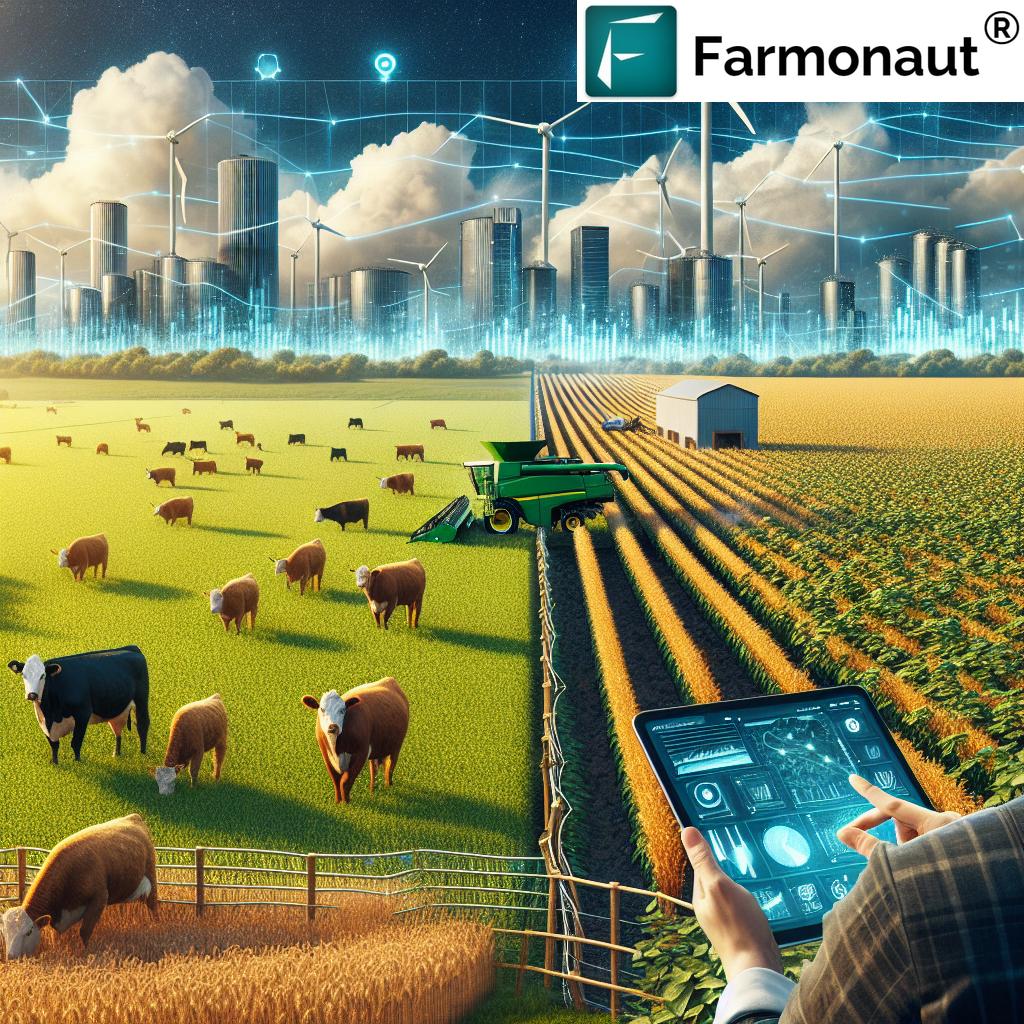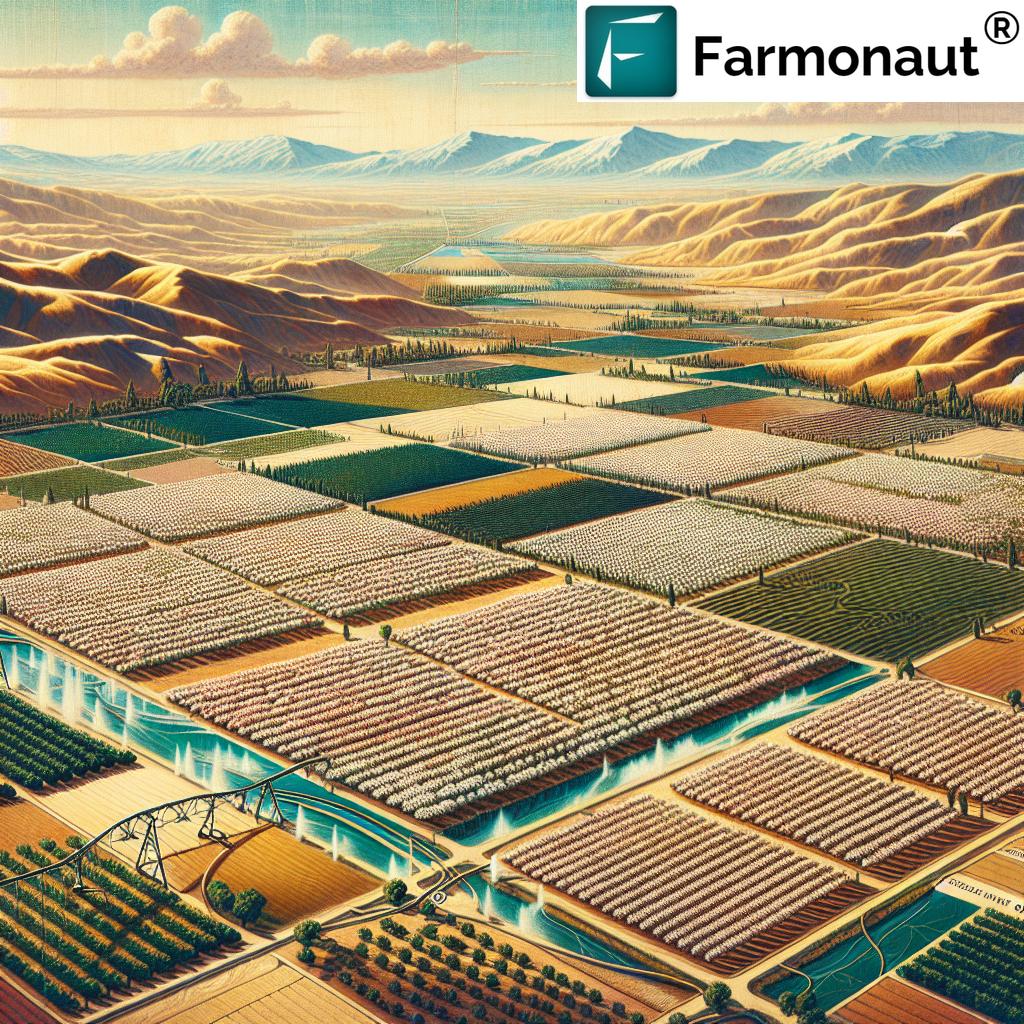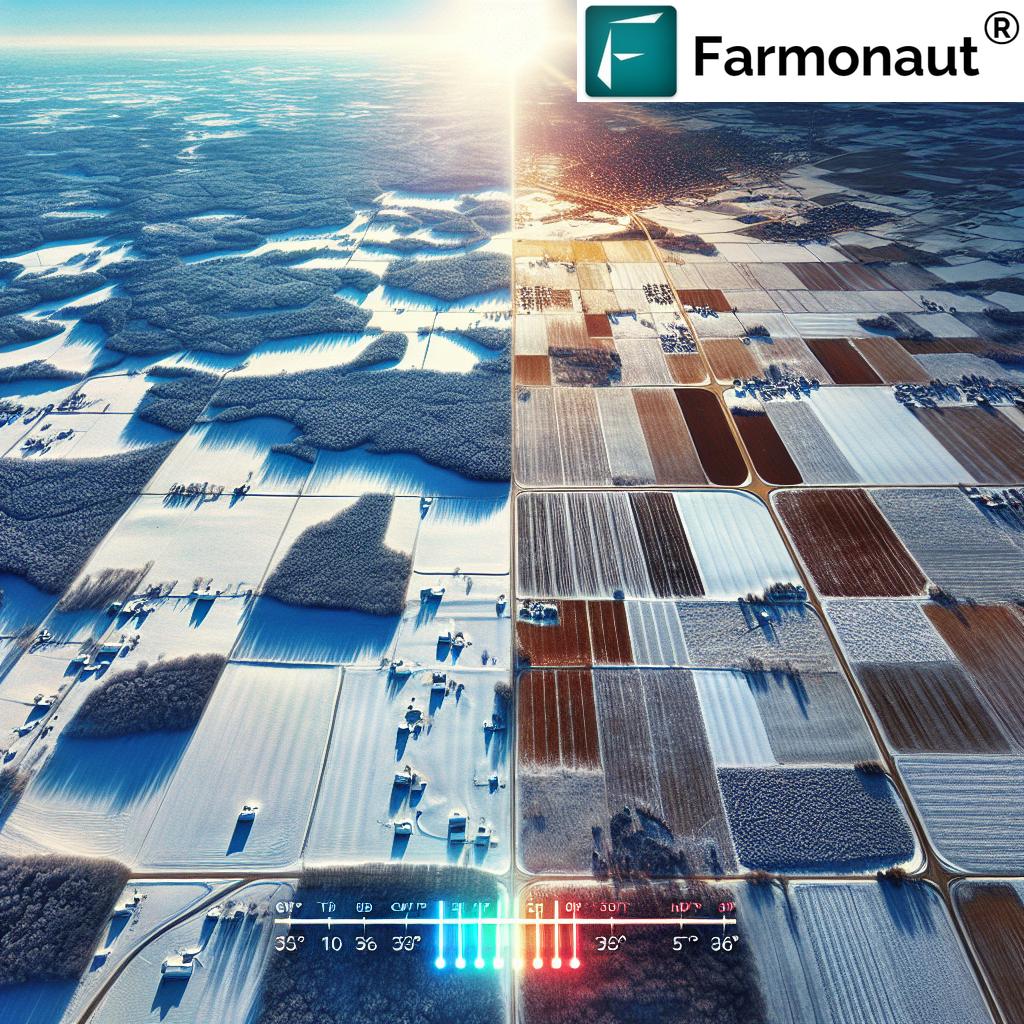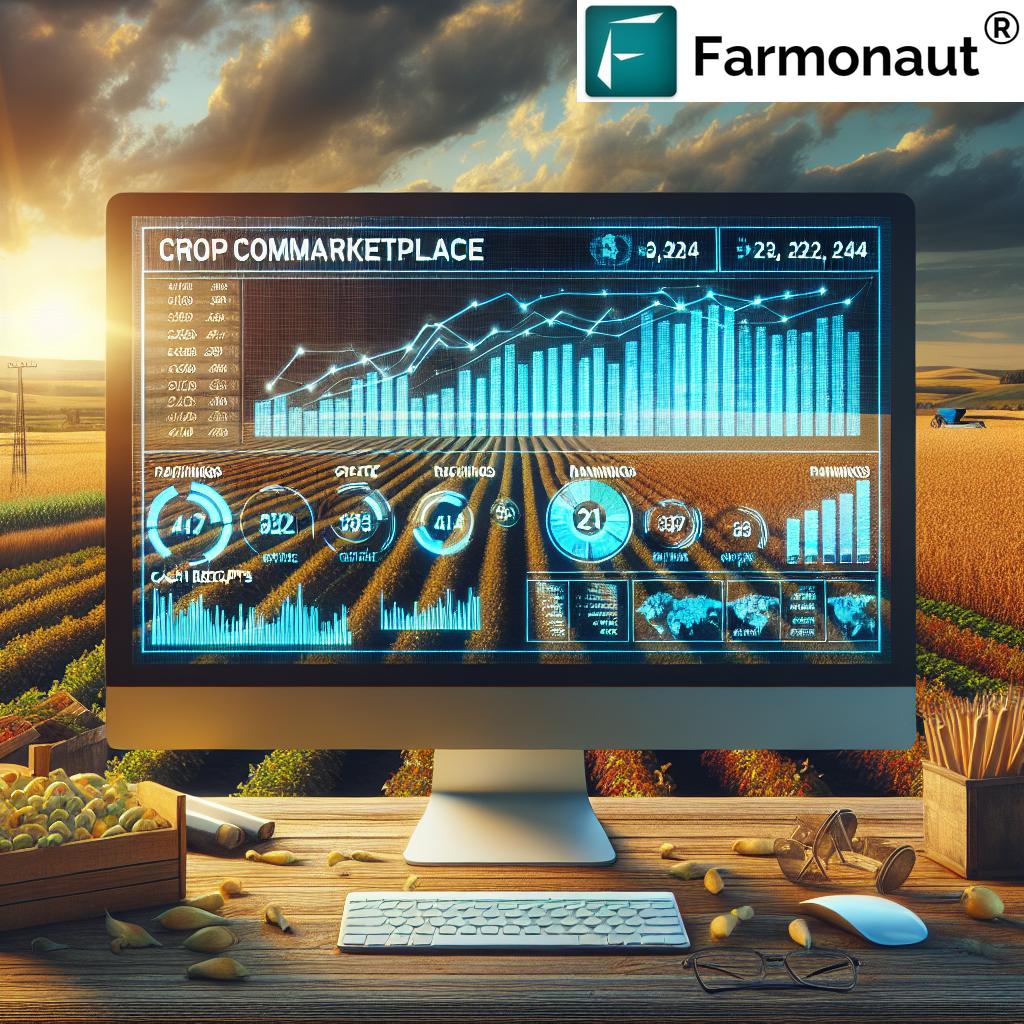2024 Farm Bill: Navigating Agricultural Policy, Trade Wars, and Sustainable Practices in Illinois and Beyond
“The 2024 Farm Bill will impact over 2 million farms across the United States, shaping agricultural policy for years to come.”
As we at Farmonaut delve into the complexities of the 2024 Farm Bill, we find ourselves at the crossroads of tradition and innovation in American agriculture. The landscape of farming is evolving rapidly, and this comprehensive legislation will play a pivotal role in shaping the future of food production, trade relations, and sustainable practices across the nation, with a particular focus on states like Illinois.
The 2024 Farm Bill: A New Era for American Agriculture
The 2024 Farm Bill represents a critical juncture for American agriculture, coming at a time when farmers face unprecedented challenges ranging from climate change to international trade tensions. This piece of legislation, renewed approximately every five years, is set to allocate billions of dollars in federal funding and will significantly influence agricultural policy, nutrition programs, and rural development initiatives.
In Illinois, a state known for its vast cornfields and soybean plantations, the implications of the new farm bill are particularly significant. As one of the top agricultural producers in the United States, Illinois stands to be greatly affected by changes in crop insurance regulations, sustainable agriculture incentives, and trade policies outlined in the bill.
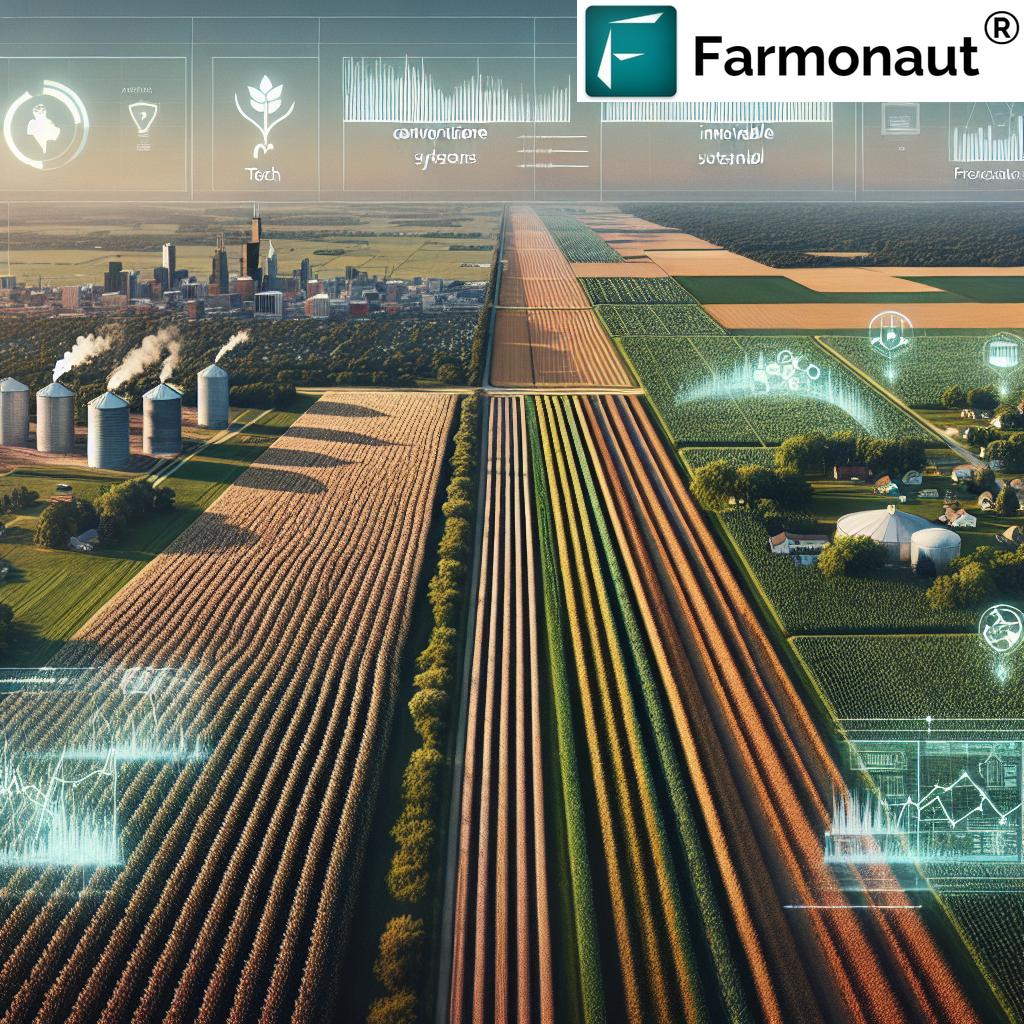
Key Components of the 2024 Farm Bill
- Crop Insurance Reforms: The new bill is expected to introduce significant changes to crop insurance regulations, aiming to provide better protection for farmers against yield losses and price declines.
- Sustainable Agriculture Initiatives: With a growing focus on climate-smart agriculture, the bill includes provisions for conservation programs and incentives for adopting environmentally friendly farming practices.
- Trade War Mitigation: In response to ongoing trade tensions, the bill incorporates measures to support farmers affected by tariffs and to promote American agricultural exports.
- Rural Development: Funding for rural infrastructure, including broadband internet access, is a key component, aiming to bridge the digital divide in farming communities.
- Nutrition Programs: The Supplemental Nutrition Assistance Program (SNAP) remains a significant part of the bill, with potential adjustments to eligibility and funding.
Impact on Illinois Agriculture
Illinois, often referred to as the heart of the Corn Belt, stands to be significantly impacted by the 2024 Farm Bill. The state’s agricultural sector, which contributes billions to the economy annually, will need to adapt to new policies and leverage opportunities presented by the bill.
- Crop Insurance: Illinois farmers, particularly those growing corn and soybeans, will closely watch changes in crop insurance programs. The new provisions could affect risk management strategies for the state’s primary crops.
- Conservation Practices: With the bill’s emphasis on sustainable agriculture, Illinois farmers may see increased support for adopting conservation tillage, cover cropping, and other environmentally friendly practices.
- Trade Support: Given the state’s reliance on agricultural exports, especially to markets like China, any trade war mitigation measures in the bill will be crucial for Illinois farmers.
At Farmonaut, we understand the importance of staying ahead in this evolving agricultural landscape. Our satellite-based farm management solutions are designed to help farmers adapt to these changes efficiently. Whether it’s optimizing crop health monitoring or implementing precision farming techniques, our technology is here to support farmers through these transitions.
Trade Wars and Agricultural Exports: A Delicate Balance
The ongoing trade tensions, particularly with China, have significantly impacted American farmers, including those in Illinois. The 2024 Farm Bill is expected to address these challenges through various measures:
- Export Promotion Programs: Enhanced funding for programs that help U.S. farmers find new international markets for their products.
- Market Access Program (MAP): Increased support for promoting U.S. agricultural products overseas.
- Trade Mitigation Payments: Potential continuation or modification of direct payments to farmers affected by retaliatory tariffs.
For Illinois, a state that exported over $8 billion worth of agricultural products in 2023, these provisions are critical. The state’s top exports, including soybeans, corn, and pork, have been particularly vulnerable to trade war impacts.
Sustainable Agriculture Practices: A Path Forward
“Precision farming technologies have increased crop yields by up to 15% while reducing water usage by 30% in some regions.”
The 2024 Farm Bill is expected to place a significant emphasis on sustainable agriculture practices, reflecting growing concerns about climate change and environmental conservation. This focus aligns well with Farmonaut’s mission to promote precision agriculture and resource efficiency.
- Conservation Stewardship Program (CSP): Expanded funding for this program, which supports ongoing conservation efforts by farmers.
- Environmental Quality Incentives Program (EQIP): Increased resources for implementing conservation practices on working lands.
- Climate-Smart Agriculture Initiatives: New programs to incentivize practices that reduce greenhouse gas emissions and enhance carbon sequestration in soils.
In Illinois, where soil health and water quality are paramount concerns, these programs could provide valuable support for farmers transitioning to more sustainable practices. Farmonaut’s satellite-based crop monitoring tools can play a crucial role in helping farmers implement and track the effectiveness of these conservation measures.
Precision Farming and AgTech: Shaping the Future of Agriculture
The 2024 Farm Bill is expected to acknowledge the growing importance of precision farming technologies and agtech startups in revolutionizing agricultural practices. This aligns perfectly with Farmonaut’s commitment to making precision agriculture accessible and affordable.
- Research Funding: Increased allocation for research and development in agricultural technologies.
- Adoption Incentives: Programs to encourage farmers to adopt precision farming technologies.
- Data Infrastructure: Support for improving rural broadband access, crucial for implementing many precision farming tools.
For Illinois farmers, embracing these technologies can lead to significant improvements in productivity and sustainability. Farmonaut’s suite of tools, including our AI-driven Jeevn advisory system and satellite-based crop monitoring, are at the forefront of this technological revolution in farming.
Explore Farmonaut’s API for advanced agricultural data insights
Commodity Futures and Agricultural Markets
The 2024 Farm Bill will have significant implications for commodity futures and agricultural markets, areas of particular interest to Illinois farmers given the state’s proximity to the Chicago Mercantile Exchange.
- Price Loss Coverage (PLC) and Agriculture Risk Coverage (ARC): Potential adjustments to these programs could affect how farmers manage risk and make planting decisions.
- Commodity Credit Corporation (CCC): Changes to CCC funding could impact market stabilization efforts and support programs.
- Futures Trading Regulations: The bill may address concerns about market volatility and speculative trading in agricultural commodities.
Understanding these market dynamics is crucial for farmers in Illinois and beyond. Farmonaut’s data-driven insights can help farmers make informed decisions about crop selection and marketing strategies in light of these policy changes.
Access our API Developer Docs for in-depth agricultural data analysis
Clean Fuel Initiatives and Crop Production
The 2024 Farm Bill is expected to address the growing intersection between agriculture and renewable energy, particularly in relation to biofuels. This is especially relevant for Illinois, a major producer of corn-based ethanol.
- Renewable Fuel Standard (RFS): Potential updates to the RFS could affect demand for corn and other biofuel feedstocks.
- Sustainable Aviation Fuel (SAF): New incentives for SAF production could create additional markets for agricultural products.
- On-Farm Energy Production: Support for farmers to integrate renewable energy systems into their operations.
These initiatives could open new revenue streams for Illinois farmers while contributing to national clean energy goals. Farmonaut’s technology can assist farmers in optimizing crop production for these emerging markets, ensuring efficient resource use and maximizing yields.
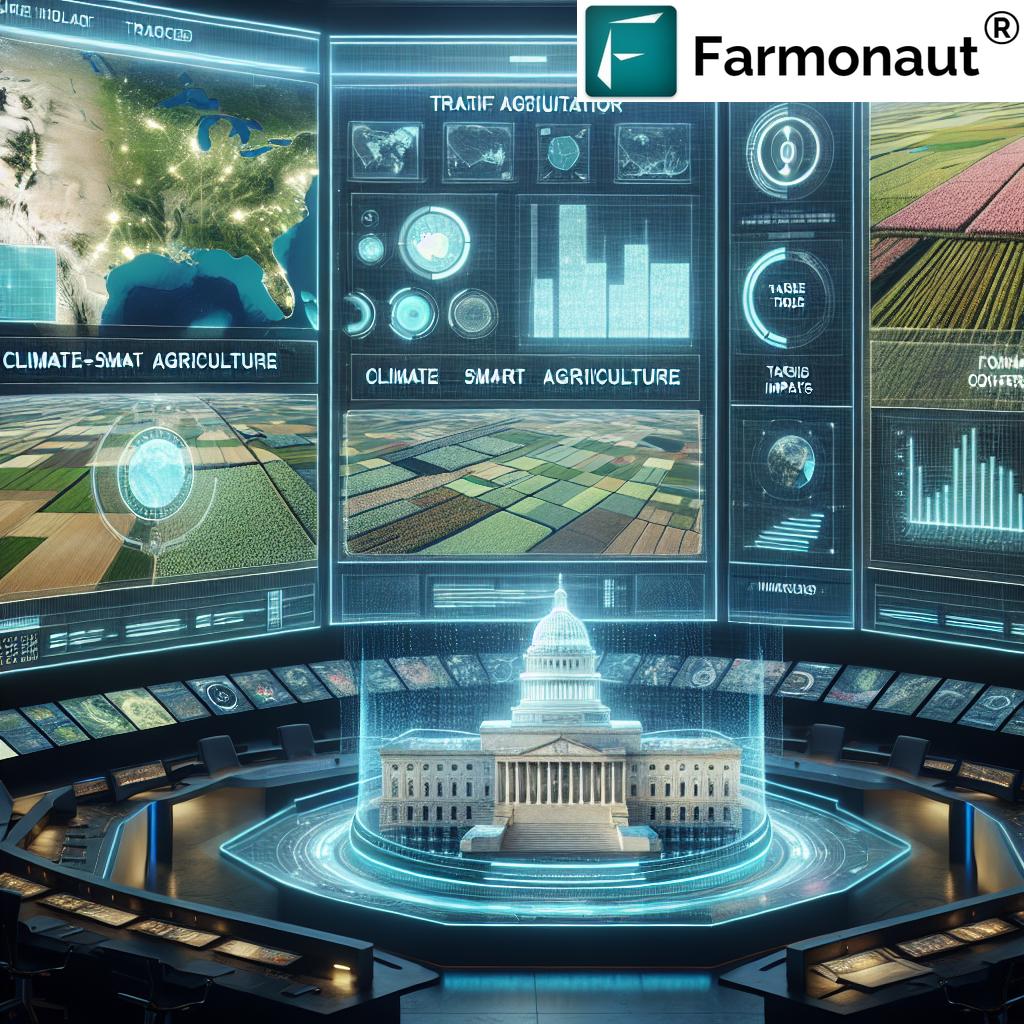
The Role of AgTech Startups in Implementing Farm Bill Initiatives
As the 2024 Farm Bill rolls out, agtech startups like Farmonaut will play a crucial role in helping farmers implement new practices and comply with updated regulations. Our innovative solutions are designed to address many of the challenges and opportunities presented by the bill:
- Precision Agriculture: Our satellite-based crop monitoring helps farmers optimize resource use, aligning with the bill’s sustainability goals.
- Data-Driven Decision Making: Farmonaut’s AI advisory system provides farmers with actionable insights, crucial for navigating complex policy landscapes.
- Compliance Tracking: Our technology can assist farmers in documenting conservation practices, potentially streamlining participation in federal programs.
By leveraging these technologies, Illinois farmers can position themselves at the forefront of agricultural innovation, maximizing the benefits of the new farm bill while contributing to more sustainable and efficient farming practices.
Global Context: International Trade and Food Security
The 2024 Farm Bill comes at a time of significant global challenges, including food security concerns and ongoing international trade tensions. For Illinois, a major agricultural exporter, these global dynamics are particularly relevant.
- Trade Agreements: The bill may influence U.S. positions in future trade negotiations, affecting export opportunities for Illinois farmers.
- Food Aid Programs: Potential changes to international food aid programs could impact demand for certain commodities.
- Climate Change Adaptation: Provisions supporting research into climate-resilient crops could have global implications for food security.
Farmonaut’s global perspective and data-driven insights can help farmers in Illinois and beyond understand and adapt to these international trends, ensuring they remain competitive in a rapidly changing global market.
The Impact of Recent Elections on Agricultural Policy
The recent elections have significantly shaped the political landscape in which the 2024 Farm Bill is being crafted. Changes in Congress and state legislatures, including in Illinois, will influence the priorities and provisions of the bill.
- Shifting Power Dynamics: Changes in committee leadership could affect the focus of the bill.
- Regional Interests: The balance between Midwest agricultural interests and those of other regions may shift based on election outcomes.
- Environmental Priorities: New elected officials may push for stronger climate-related provisions in the bill.
For Illinois farmers, staying informed about these political shifts is crucial. Farmonaut’s commitment to providing up-to-date information and analysis can help farmers navigate these changing policy landscapes effectively.
2024 Farm Bill Impact Analysis
| State | Crop Insurance Changes | Sustainable Agriculture Initiatives | Trade War Impact | Precision Farming Adoption Rate |
|---|---|---|---|---|
| Illinois | +5% coverage expansion | $100M for soil health programs | -8% export value (soybeans) | 65% |
| Iowa | +3% coverage expansion | $80M for water quality initiatives | -7% export value (corn) | 70% |
| California | +2% coverage for specialty crops | $150M for drought resilience | -5% export value (fruits/nuts) | 55% |
| Texas | +4% coverage for livestock | $90M for regenerative grazing | -6% export value (cotton) | 50% |
| Nebraska | +3.5% coverage expansion | $70M for water conservation | -7.5% export value (beef) | 60% |
Looking Ahead: The Future of Farming in Illinois and Beyond
As we navigate the complexities of the 2024 Farm Bill and its implications for agriculture in Illinois and across the nation, several key trends emerge:
- Technological Integration: The increasing adoption of precision farming technologies will be crucial for maximizing efficiency and sustainability.
- Climate Resilience: Farmers will need to adapt to changing climate patterns, with support from both policy measures and innovative technologies.
- Market Diversification: In response to trade uncertainties, farmers may seek to diversify their crops and target new markets.
- Data-Driven Decision Making: The use of big data and AI in agriculture will become increasingly important for strategic planning and risk management.
At Farmonaut, we are committed to supporting farmers through these transitions. Our suite of tools, from satellite-based crop monitoring to AI-powered advisory systems, are designed to help farmers thrive in this evolving agricultural landscape.
Conclusion: Embracing Change in Agriculture
The 2024 Farm Bill represents a pivotal moment for American agriculture, particularly for states like Illinois that play a crucial role in the nation’s food production. As we navigate the complexities of new policies, trade challenges, and environmental concerns, the importance of innovation and adaptability in farming cannot be overstated.
Farmers in Illinois and across the country will need to leverage every tool at their disposal to thrive in this new agricultural landscape. From embracing sustainable practices to adopting cutting-edge technologies, the future of farming will be shaped by those who can adapt most effectively to these changes.
At Farmonaut, we remain committed to supporting farmers through this transition. Our technology provides the insights and tools needed to make informed decisions, optimize resource use, and increase productivity in an ever-changing agricultural environment. As we move forward, we invite farmers, policymakers, and agricultural stakeholders to join us in embracing these changes and working towards a more sustainable, efficient, and prosperous future for American agriculture.
FAQ Section
Q1: How will the 2024 Farm Bill affect crop insurance for Illinois farmers?
A1: The 2024 Farm Bill is expected to introduce changes to crop insurance regulations, potentially expanding coverage for Illinois farmers. This could include adjustments to premium subsidies, coverage levels, and the types of crops eligible for insurance.
Q2: What sustainable agriculture initiatives are included in the new Farm Bill?
A2: The bill is likely to include expanded funding for programs like the Conservation Stewardship Program (CSP) and the Environmental Quality Incentives Program (EQIP). It may also introduce new initiatives focused on climate-smart agriculture and soil health.
Q3: How does the Farm Bill address trade war impacts on farmers?
A3: The bill is expected to include measures to support farmers affected by trade tensions, such as enhanced export promotion programs and potential continuation of trade mitigation payments.
Q4: What role does precision farming play in the new Farm Bill?
A4: The 2024 Farm Bill is likely to acknowledge the importance of precision farming technologies, potentially including incentives for adoption and funding for related research and development.
Q5: How can Farmonaut’s technology help farmers adapt to the new Farm Bill provisions?
A5: Farmonaut’s satellite-based crop monitoring and AI advisory systems can help farmers implement sustainable practices, optimize resource use, and make data-driven decisions in line with new policy requirements.






